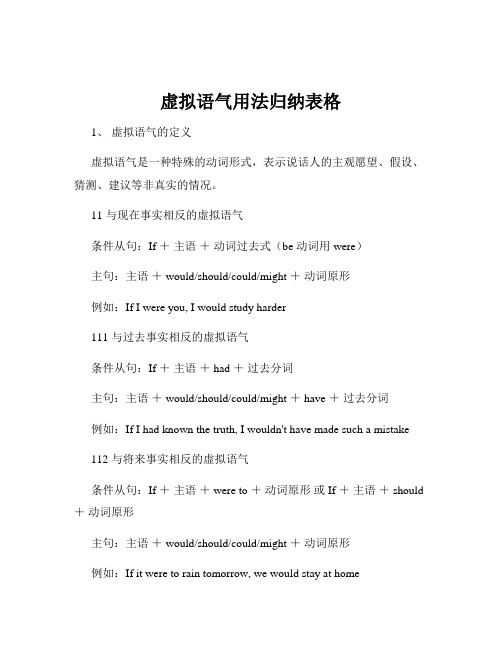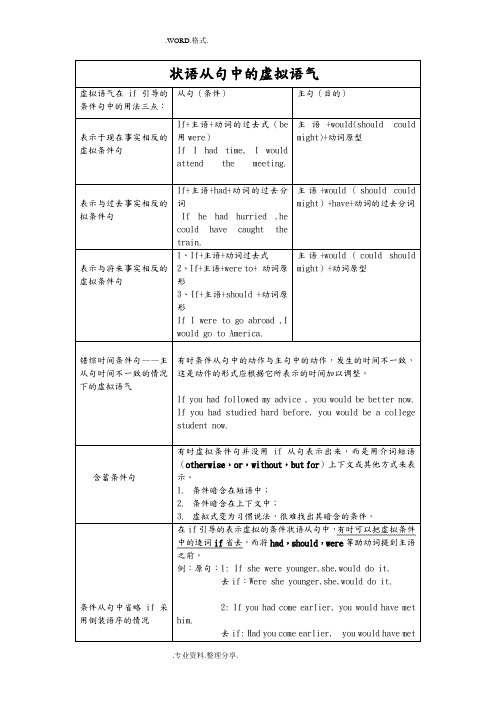完整虚拟语气用法表格归纳图13093
虚拟语气用法归纳表格

虚拟语气用法归纳表格1、虚拟语气的定义虚拟语气是一种特殊的动词形式,表示说话人的主观愿望、假设、猜测、建议等非真实的情况。
11 与现在事实相反的虚拟语气条件从句:If +主语+动词过去式(be 动词用 were)主句:主语+ would/should/could/might +动词原形例如:If I were you, I would study harder111 与过去事实相反的虚拟语气条件从句:If +主语+ had +过去分词主句:主语+ would/should/could/might + have +过去分词例如:If I had known the truth, I wouldn't have made such a mistake 112 与将来事实相反的虚拟语气条件从句:If +主语+ were to +动词原形或 If +主语+ should +动词原形主句:主语+ would/should/could/might +动词原形例如:If it were to rain tomorrow, we would stay at home121 wish 后的宾语从句与现在事实相反:从句用一般过去时与过去事实相反:从句用过去完成时与将来事实相反:从句用 would/could +动词原形例如:I wish I were a bird (与现在事实相反)122 would rather 后的宾语从句与现在或将来事实相反:从句用一般过去时与过去事实相反:从句用过去完成时例如:I would rather you came tomorrow (与将来事实相反)13 虚拟语气在主语从句中的应用It is +形容词+ that 句型中,形容词为 necessary, important, strange 等时,从句用“should +动词原形”,should 可以省略。
例如:It is necessary that we (should) study hard14 虚拟语气在表语从句和同位语从句中的应用与主语从句类似,在 suggestion, proposal, order 等名词后的表语从句和同位语从句中,从句用“should +动词原形”,should 可以省略。
完整虚拟语气用法表格归纳图

状语从句中的虚拟语气虚拟语气在if引导的条件句中的用法三点:从句(条件)主句(目的)表示于现在事实相反的虚拟条件句If+主语+动词的过去式(be用were)If I had time, I would attendthe meeting.主语+would(should couldmight)+动词原型表示与过去事实相反的拟条件句If+主语+had+动词的过去分词If he had hurried ,he couldhave caught the train.主语+would(should couldmight)+have+动词的过去分词表示与将来事实相反的虚拟条件句1、If+主语+动词过去式2、If+主语+were to+ 动词原形3、If+主语+should +动词原形If I were to go abroad ,I wouldgo to America.主语+would(could shouldmight)+动词原型错综时间条件句——主从句时间不一致的情况下的虚拟语气有时条件从句中的动作与主句中的动作,发生的时间不一致,这是动作的形式应根据它所表示的时间加以调整。
If you had followed my advice , you would be better now.If you had studied hard before, you would be a college student now.含蓄条件句有时虚拟条件句并没用if从句表示出来,而是用介词短语(otherwise,or,without,but for)上下文或其他方式来表示。
1.条件暗含在短语中;2.条件暗含在上下文中;3.虚拟式变为习惯说法,很难找出其暗含的条件。
条件从句中省略if采用倒装语序的情况在if引导的表示虚拟的条件状语从句中,有时可以把虚拟条件中的连词if省去,而将had,should,were等助动词提到主语之前。
(完整word版)虚拟语气表格归纳

状语从句中的虚构语气虚构语气在 if 指引的条从句(条件)主句(目的)件句中的用法三点:表示于此刻事实相反的If+ 主语 +动词的过去式( be 用主语 +would(shouldcould虚构条件句were)might)+ 动词原型表示与过去事实相反的If+ 主语 +had+ 动词的过去分主语 +would ( should could 拟条件句词might ) +have+动词的过去分词表示与未来事实相反的If+ 主语 +should( were to) + 主语 +would ( could should 虚构条件句动词原型 / 动词的过去式might ) +动词原型混淆条件句——主从句有时条件从句中的动作与主句中的动作,发生的时间不一致,时间不一致的状况下的这是动作的形式应依据它所表示的时间加以调整。
虚构语气有时虚构条件句并没用if从句表示出来,而是用介词短语委婉条件句( otherwise ,or ,without ,but for )上下文或其余方式来表示。
条件从句中省略 if 采纳倒装语序的状况虚拟语气在 as if/as though 指引的方式状语从句中1.条件暗含在短语中;2.条件暗含在上下文中;3.虚构式变成习惯说法,很难找出其暗含的条件。
在if 指引的表示虚构的条件状语从句中,有时能够把虚构条件中的连词 if 省去,而将 had , should , were 等助动词提到主语以前。
例:原句: If she were younger,she,would do it.去if : Were she younger,she,would do it.1.表示与此刻事实相反或对此刻状况有思疑,谓语动词用过去式。
2.表示与过去事实相反,谓语动词用过去达成时。
3.表示与未来事实相反注意: 1.在 as if/as though 句中,假如有可能成为事实,用陈说语气。
例: He looks as if he going to be ill.2.as though 或 as if 指引的状语从句,从句主语和主句主语同样时,从句中可省略主语和部分谓语。
完整虚拟语气用法表格归纳图

状语从句中的虚拟语气虚拟语气在if 引导的条从句(条件)主句(目的)件句中的用法三点:主语+would(should couldIf+ 主语+动词的过去式(be用表示于现在事实相反的were)might)+ 动词原型虚拟条件句If I had time, I would attendthe meeting.主语+would (should couldIf+ 主语+had+动词的过去分表示与过去事实相反的词might )+have+动词的过去分词拟条件句If he had hurried ,he couldhave caught the train.主语+would (could should1、If+ 主语+动词过去式表示与将来事实相反的2、If+ 主语+were to+ 动词原might )+动词原型虚拟条件句形3、If+ 主语+should + 动词原形If I were to go abroad ,I wouldgo to America.错综时间条件句——主有时条件从句中的动作与主句中的动作,发生的时间不一致,从句时间不一致的情况这是动作的形式应根据它所表示的时间加以调整。
下的虚拟语气If you had followed my advice , you would be better now.If you had studied hard before, you would be a college student now.有时虚拟条件句并没用if 从句表示出来,而是用介词短语(otherwise,or,without,but for )上下文或其他方式来表示。
含蓄条件句 1. 条件暗含在短语中;2. 条件暗含在上下文中;3. 虚拟式变为习惯说法,很难找出其暗含的条件。
在if 引导的表示虚拟的条件状语从句中,有时可以把虚拟条件中的连词if 省去,而将had,should,were 等助动词提到主语之前。
完整虚拟语气用法表格归纳图

状语从句中的虚拟语气虚拟语气在if引导的条件句中的用法三点:从句(条件)主句(目的)表示于现在事实相反的虚拟条件句If+主语+动词的过去式(be用were)If I had time, I wouldattend the meeting.主语+would(should couldmight)+动词原型表示与过去事实相反的拟条件句If+主语+had+动词的过去分词If he had hurried ,hecould have caught thetrain.主语+would(should couldmight)+have+动词的过去分词表示与将来事实相反的虚拟条件句1、If+主语+动词过去式2、If+主语+were to+ 动词原形3、If+主语+should +动词原形If I were to go abroad ,Iwould go to America.主语+would(could shouldmight)+动词原型错综时间条件句——主从句时间不一致的情况下的虚拟语气有时条件从句中的动作与主句中的动作,发生的时间不一致,这是动作的形式应根据它所表示的时间加以调整。
If you had followed my advice , you would be better now. If you had studied hard before, you would be a college student now.含蓄条件句有时虚拟条件句并没用if从句表示出来,而是用介词短语(otherwise,or,without,but for)上下文或其他方式来表示。
1.条件暗含在短语中;2.条件暗含在上下文中;3.虚拟式变为习惯说法,很难找出其暗含的条件。
条件从句中省略if采用倒装语序的情况在if引导的表示虚拟的条件状语从句中,有时可以把虚拟条件中的连词if省去,而将had,should,were等助动词提到主语之前。
(完整版)完整虚拟语气用法表格归纳图

在expect,believe,think,suspect等动词的否定或疑问形式后的宾语从句中的虚拟语气
经常用“should+动词原型(或完成形式),表示惊奇,怀疑,不满等情绪。
I cannot believe that you should think so.
在“It is (was)+名词+that…..”结构句中的虚拟语气
表示建议,命令,请求,道歉,怀疑,惊奇等。
It’s a pity that you (should) miss a good chance.
这类名词有:advice,decision,desire,demand,idea,order,pity,proposal,recommendation,suggestion,surprise,wish,wonder等。
“In case”引导的从句中即可用陈述句,也可以用虚拟语气
(should)+动词原型
例:1.The game will be put off in case it (should) snow.
2.The game will be put off in case it snows.
名词性从句中的虚拟语气
表示“要求”的:ask,desire, request,demand,require,beg
表示“同意,坚持”的:insist
表示“决定,命令”的:decide,order
注意:suggest,insist不表示建议或坚持要某人做某事时,即它们用于其本意暗示,表明,坚持认为时,宾语从句用陈述语气。
完整虚拟语气用法表格归纳图

表达形式为should+动词原形或省略should
It’s quite necessary that we should have a walk now.
常用的形容词:natural,appropriate,advisable,necessary,important,urgent,probable,possible,desirable,strange。
去if:Were she younger,she,would do it.
2: If you had come earlier, you would have met him.
去if: Had you come earlier, you would have met him
3:If it should rain tomorrow, we would not go climbing.
注意:1.在as if/as though句中,如果有可能成为事实,用陈述语气。
例:He looks2.as though或as if引导的状语从句,从句主语和主句主语相同时,从句中可省略主语和部分谓语。
虚拟语气用在lest,for fear that,so that及in order that引导的目的状语从句中表示“以防,以免”等意思
在“It is (was)+名词+that…..”结构句中的虚拟语气
表示建议,命令,请求,抱歉,疑心,惊奇等。
It’s a pity that you (should) miss a good chance.
这类名词有:advice,decision,desire,demand,idea,order,pity,proposal,recommendation,suggestion,surprise,wish,wonder等。
完整虚拟语气用法表格归纳图

状语从句中的虚拟语气虚拟语气在if引导的条件句中的用法三点:从句(条件)主句(目的)表示于现在事实相反的虚拟条件句If+主语+动词的过去式(be用were)If I had time, I would attendthe meeting.主语+would(should couldmight)+动词原型表示与过去事实相反的拟条件句If+主语+had+动词的过去分词If he had hurried ,he couldhave caught the train.主语+would(should couldmight)+have+动词的过去分词表示与将来事实相反的虚拟条件句1、If+主语+动词过去式2、If+主语+were to+ 动词原形3、If+主语+should +动词原形If I were to go abroad ,I wouldgo to America.主语+would(could shouldmight)+动词原型错综时间条件句——主从句时间不一致的情况下的虚拟语气有时条件从句中的动作与主句中的动作,发生的时间不一致,这是动作的形式应根据它所表示的时间加以调整。
If you had followed my advice , you would be better now.If you had studied hard before, you would be a college student now.含蓄条件句有时虚拟条件句并没用if从句表示出来,而是用介词短语(otherwise,or,without,but for)上下文或其他方式来表示。
1.条件暗含在短语中;2.条件暗含在上下文中;3.虚拟式变为习惯说法,很难找出其暗含的条件。
条件从句中省略if采用倒装语序的情况在if引导的表示虚拟的条件状语从句中,有时可以把虚拟条件中的连词if省去,而将had,should,were等助动词提到主语之前。
完整虚拟语气用法表格归纳图

状语从句中的虚拟语气虚拟语气在if引导的条件句中的用法三点:从句(条件)主句(目的)表示于现在事实相反的虚拟条件句If+主语+动词的过去式(be用were)If I had time, I would attendthe meeting.主语+would(should couldmight)+动词原型表示与过去事实相反的拟条件句If+主语+had+动词的过去分词If he had hurried ,he couldhave caught the train.主语+would(should couldmight)+have+动词的过去分词表示与将来事实相反的虚拟条件句1、If+主语+动词过去式2、If+主语+were to+ 动词原形3、If+主语+should +动词原形If I were to go abroad ,I wouldgo to America.主语+would(could shouldmight)+动词原型错综时间条件句——主从句时间不一致的情况下的虚拟语气有时条件从句中的动作与主句中的动作,发生的时间不一致,这是动作的形式应根据它所表示的时间加以调整。
If you had followed my advice , you would be better now.If you had studied hard before, you would be a college student now.含蓄条件句有时虚拟条件句并没用if从句表示出来,而是用介词短语(otherwise,or,without,but for)上下文或其他方式来表示。
1.条件暗含在短语中;2.条件暗含在上下文中;3.虚拟式变为习惯说法,很难找出其暗含的条件。
条件从句中省略if采用倒装语序的情况在if引导的表示虚拟的条件状语从句中,有时可以把虚拟条件中的连词if省去,而将had,should,were等助动词提到主语之前。
完整虚拟语气用法表格归纳图

状语从句中的虚拟语气虚拟语气在if引导的条件句中的用法三点:从句(条件)主句(目的)表示于现在事实相反的虚拟条件句If+主语+动词的过去式(be用were)If I had time, I would attendthe meeting.主语+would(should couldmight)+动词原型表示与过去事实相反的拟条件句If+主语+had+动词的过去分词If he had hurried ,he couldhave caught the train.主语+would(should couldmight)+have+动词的过去分词表示与将来事实相反的虚拟条件句1、If+主语+动词过去式2、If+主语+were to+ 动词原形3、If+主语+should +动词原形If I were to go abroad ,I wouldgo to America.主语+would(could shouldmight)+动词原型错综时间条件句——主从句时间不一致的情况下的虚拟语气有时条件从句中的动作与主句中的动作,发生的时间不一致,这是动作的形式应根据它所表示的时间加以调整。
If you had followed my advice , you would be better now.If you had studied hard before, you would be a college student now.含蓄条件句有时虚拟条件句并没用if从句表示出来,而是用介词短语(otherwise,or,without,but for)上下文或其他方式来表示。
1.条件暗含在短语中;2.条件暗含在上下文中;3.虚拟式变为习惯说法,很难找出其暗含的条件。
条件从句中省略if采用倒装语序的情况在if引导的表示虚拟的条件状语从句中,有时可以把虚拟条件中的连词if省去,而将had,should,were等助动词提到主语之前。
完整虚拟语气用法表格归纳图

that-clause句型中从句用(should )+动词原型
It is demanded that we should work out a plan.
这类名词罕见的有:demand,desire,requirement,advice,recommendation,suggestion,order,necessity,proposal,plan,idea。
注意:1.在as if/as though句中,如果有可能成为事实,用陈述语气。
例:He looks as if he going to be ill.
2.as though或as if引导的状语从句,从句主语和主句主语相同时,从句中可省略主语和部分谓语。
虚拟语气用在lest,for fear that,so that及in order that引导的目的状语从句中暗示“以防,以免”等意思
注意:在上述所列形容词后面用that引出的宾语从句中,谓语动词也要用虚拟语气。
例:I don’t think it advisable that tom be assigned to the job since he has no experience.(汤姆缺乏经验,指派他做这项工作我认为是不恰当的).
在“It is (was)+名词+that…..”结构句中的虚拟语气
暗示建议,命令,请求,道歉,怀疑,惊奇等。
It’s a pity that you (should) miss a good chance.
这类名词有:advice,decision,desire,demand,idea,order,pity,proposal,recommendation,suggestion,surprise,wish,wonder等。
完整虚拟语气用法表格归纳图

表示“决定,命令”的:decide,order
注意:suggest,insist不表示建议或坚持要某人做某事时,即它们用于其本意暗示,表明,坚持认为时,宾语从句用陈述语气。
The smile on his face suggested(暗示) that he was satisfied with our work.
表达形式为should+动词原形或省略should
It’s quite necessary that we should have a walk now.
常用的形容词:natural,appropriate,advisable,necessary,important,urgent,probable,possible,desirable,strange。
在“It is (was)+名词+that…..”结构句中的虚拟语气
表示建议,命令,请求,道歉,怀疑,惊奇等。
It’s a pity that you (should) miss a good chance.
这类名词有:advice,decision,desire,demand,idea,order,pity,proposal,recommendation,suggestion,surprise,wish,wonder等。
对将来情况的虚拟:从句谓语“would/should/could/might+动词原形”。
I wish (that) I would\could go.
在表示建议,命令,要求,忠告,等动词的后面的宾语从句中的虚拟语气
均以“should+动词原型”表示这种语气,“should”常被省略。
完整虚拟语气用法表格归纳图

状语从句中的虚拟语气虚拟语气在if引导的条件句中的用法三点:从句(条件)主句(目的)表示于现在事实相反的虚拟条件句If+主语+动词的过去式(be用were)If I had time, I would attendthe meeting.主语+would(should couldmight)+动词原型表示与过去事实相反的拟条件句If+主语+had+动词的过去分词If he had hurried ,he couldhave caught the train.主语+would(should couldmight)+have+动词的过去分词表示与将来事实相反的虚拟条件句1、If+主语+动词过去式2、If+主语+were to+ 动词原形3、If+主语+should +动词原形If I were to go abroad ,I wouldgo to America.主语+would(could shouldmight)+动词原型错综时间条件句——主从句时间不一致的情况下的虚拟语气有时条件从句中的动作与主句中的动作,发生的时间不一致,这是动作的形式应根据它所表示的时间加以调整。
If you had followed my advice , you would be better now.If you had studied hard before, you would be a college student now.含蓄条件句有时虚拟条件句并没用if从句表示出来,而是用介词短语(otherwise,or,without,but for)上下文或其他方式来表示。
1.条件暗含在短语中;2.条件暗含在上下文中;3.虚拟式变为习惯说法,很难找出其暗含的条件。
条件从句中省略if采用倒装语序的情况在if引导的表示虚拟的条件状语从句中,有时可以把虚拟条件中的连词if省去,而将had,should,were等助动词提到主语之前。
- 1、下载文档前请自行甄别文档内容的完整性,平台不提供额外的编辑、内容补充、找答案等附加服务。
- 2、"仅部分预览"的文档,不可在线预览部分如存在完整性等问题,可反馈申请退款(可完整预览的文档不适用该条件!)。
- 3、如文档侵犯您的权益,请联系客服反馈,我们会尽快为您处理(人工客服工作时间:9:00-18:30)。
We suggested that the meeting (should) be put off.
They insisted that the boy (should) go with them.
常用的此类动词有:
表示“提议,劝告,建议”的:propose,suggest,recommend,advise.
2.表示与过去事实相反,谓语动词用过去完成时。
He spoke as if he had known about it.
3.表示与将来事实相反,(表示将来的可能性不大),用would (might, could)+动词原形
He acts as if he could win in the game .
状语从句中的虚拟语气
虚拟语气在if引导的条件句中的用法三点:
从句(条件)
主句(目的)
表示于现在事实相反的虚拟条件句
If+主语+动词的过去式(be用were)
If I had time, I would attend the meeting.
主语+would(should could might)+动词原型
表示“要求”的:ask,desire, request,demand,require,beg
表示“同意,坚持”的:insist
表示“决定,命令”的:decide,order
注意:suggest,insist不表示建议或坚持要某人做某事时,即它们用于其本意暗示,表明,坚持认为时,宾语从句用陈述语气。
The smile on his face suggested(暗示) that he was satisfied with our work.
去if:Should it rain tomorrow, we would not go climbing.
虚拟语气在as if/as though引导的方式状语从句中
1.表示与现在事实相反或对现在情况有怀疑,谓语动词用过去式。
He treats the boy as if he were his own son.
“In case”引导的从句中即可用陈述句,也可以用虚拟语气
(should)+动词原型
例:1.The game will be put off in case it (should) snow.
2.The game will be put off in case it snows.
名词性从句中的虚拟语气
2、If+主语+were to+ 动词原形
3、If+主语+should +动词原形
If I were to go abroad ,I would go to America.
主语+would(could should might)+动词原型
错综时间条件句——主从句时间不一致的情况下的虚拟语气
有时条件从句中的动作与主句中的动作,发生的时间不一致,这是动作的形式应根据它所表示的时间加以调整。
The man insisted 【坚持认为】that he had never stolen the money.
在expect,believe,think,suspect等动词的否定或疑问形式后的宾语从句中的虚拟语气
经常用“should+动词原型(或完成形式),表示惊奇,怀疑,不满等情绪。
I cannot believe that you should think so.
If you had followed my advice , you would be better now.
If you had studied hard before, you would be a college student now.
含蓄条件句
有时虚拟条件句并没用if从句表示出来,而是用介词短语(otherwise,or,without,but for)上下文或其他方式来表示。
This is the second time that we have achieved such a great success.
If only 引起的感“要是…..多好”,表示说话人的一种愿望。
表示现在的情况,应用过去式;
表示过去的情况,应用过去完成时态
even if ( even though) 引导的让步状语从句中的虚拟语气
表示一种让步语气,即使...也做不成某事。
表示现在的情况,应用过去式
表示过去的情况,应用过去完成时态
Even if he were here, he could not solve the problem.
Even if I had been busy then, I would have helped you.
去if:Were she younger,she,would do it.
2: If you had come earlier, you would have met him.
去if: Had you come earlier, you would have met him
3:If it should rain tomorrow, we would not go climbing.
谓语动词多用should/could/might+动词原型构成
For fear that it may rain tomorrow, we should bring an umbrella.
由“providing(that)/provided(that)/on condition that/suppose(that)/supposing(that)”引导的条件从句
表示将来的情况,用would+动词原形
例:If only he didn’t drive so fast!(现在)
Look at the terrible situationIam in !if onlyIhad followed your advice(过去)
If only the rain would stop.(将来)
在It is (about/high) time+that 定语从句中的虚拟语气
表示“该做……..的时候了”
其动词形式用一般过去时或should+动词原型
It is high time that you went / should go to school.
注意:在this is the first time/ second time that….句型中,从句中谓语动词用陈述语气完成时态。
在It is demanded/suggested/ordered/required….
that-clause句型中从句用(should )+动词原型
It is demanded that we should work out a plan.
这类名词常见的有:demand,desire,requirement,advice,recommendation,suggestion,order,necessity,proposal,plan,idea。
“It is(was)+形容词(或过去分词)+that….”结构中的虚拟语气
表达形式为should+动词原形或省略should
It’s quite necessary that we should have a walk now.
常用的形容词:natural,appropriate,advisable,necessary,important,urgent,probable,possible,desirable,strange。
表语从句或同位语从句中的虚拟语气
某些表示建议,请求,命令等主观意向的名词做主语时,其后的表语从句或同位语从句需用虚拟语气
表达形式为should+动词原型或直接用动词原型。
My idea is that we (should ) think it over before accepting it.
We all agree to that suggestion that the meeting (should) be put off.
注意:在上述所列形容词后面用that引出的宾语从句中,谓语动词也要用虚拟语气。
例:I don’t think it advisable that tom be assigned to the job since he has no experience.(汤姆缺乏经验,指派他做这项工作我认为是不恰当的).
I wish (that) I had seen the film last night.
对将来情况的虚拟:从句谓语“would/should/could/might+动词原形”。
I wish (that) I would\could go.
在表示建议,命令,要求,忠告,等动词的后面的宾语从句中的虚拟语气
表示与过去事实相反的拟条件句
If+主语+had+动词的过去分词
If he had hurried ,he could have caught the train.
主语+would(should could might)+have+动词的过去分词
表示与将来事实相反的虚拟条件句
1、If+主语+动词过去式
一:宾语从句中的虚拟语气
1.在动词wish/hope后的宾语从句中的虚拟语气,表示一种不可能实现的愿望。
对现在情况的虚拟:从句谓语动词用过去式或过去进行式。
